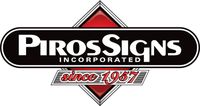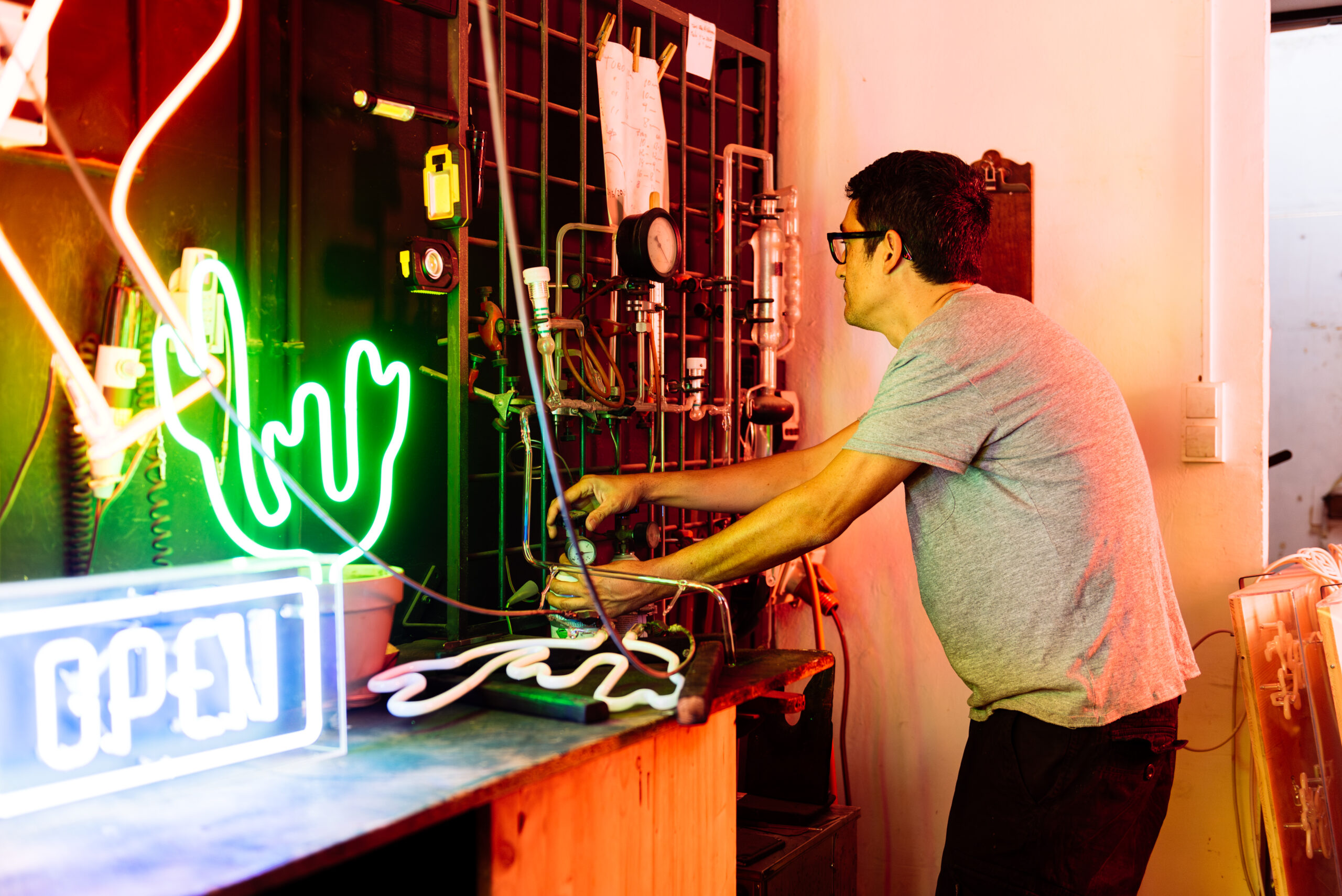Custom business signs are a powerful tool for enhancing brand recognition and credibility. A well-designed sign not only attracts attention but also establishes trust and professionalism. Studies show that effective signage influences customer perception and foot traffic, making it an essential investment for businesses. Whether it’s metal signs, neon signs, or other custom signage, businesses have a variety of options to showcase their brand identity and attract potential customers.
Why Custom Business Signs Matter for Brand Identity
The Role of Signage in Business Success
First impressions matter. According to a FedEx Signage Study, 76% of consumers entered a store based on its signage. A high-quality business sign conveys credibility, professionalism, and trustworthiness, making it a key factor in customer attraction. A well-designed storefront sign can increase walk-in traffic, directly impacting revenue.
For example, a boutique that upgraded from a generic printed banner to an illuminated metal sign saw a 30% increase in foot traffic within months. This demonstrates how the right signage influences purchasing decisions and encourages passersby to explore a business. Additionally, studies show that 60% of businesses reported a sales increase after improving their signage, reinforcing its importance in attracting and retaining customers.
Beyond direct customer engagement, signage also plays a significant role in differentiating a business from competitors. A unique, custom-designed sign helps a brand stand out in a crowded marketplace, making it more likely that customers will remember and return. Professional signage also signals longevity and stability, instilling confidence in potential customers that the business is reputable and here to stay.
How Custom Signs Strengthen Brand Recognition
Consistency is key in branding. Custom signs reinforce a business’s visual identity by aligning with logos, fonts, and colors across all marketing materials. Brand recognition increases by up to 80% when businesses maintain uniform branding across all touchpoints, including signage, advertising, and digital marketing.
For instance, Starbucks’ iconic green signage is instantly recognizable worldwide. The company’s use of metal and illuminated signs ensures brand recall and consistency across all locations. Customers associate the recognizable signage with the brand’s reputation for quality and reliability.
Similarly, businesses that integrate their color schemes and logo elements into signage create stronger brand awareness. Think of McDonald’s golden arches, which are synonymous with fast food and a family-friendly atmosphere. The use of consistent brand elements in signage fosters long-term customer retention by reinforcing familiarity and trust.
Additionally, emotional connections play a role in brand recognition. Certain sign elements, like warm neon lighting or rustic wood finishes, evoke nostalgia and comfort, drawing customers in. Businesses that strategically use design elements in signage can create subconscious positive associations, increasing customer loyalty over time.
Buyer Intent: When Businesses Need Custom Signs
Businesses invest in custom signs for various reasons, including:
- Launching a new business: Bold, visible signage is crucial for making a strong first impression. A well-placed, high-quality sign not only attracts potential customers but also establishes the business as a professional and credible entity from day one. New businesses that invest in custom storefront signage often see increased visibility compared to those using generic or temporary signage.
- Rebranding: Modernizing a business identity through custom metal or neon signage can signal to customers that the business is evolving. For instance, a traditional company looking to appeal to younger audiences might transition to an LED neon sign to enhance its modern appeal. Businesses undergoing rebranding efforts can see a brand perception shift within months by upgrading to contemporary signage solutions.
- Expansion: Maintaining brand consistency across multiple locations with customized signs is crucial for franchises and chain businesses. Recognizable signage across locations builds trust and reinforces a brand’s identity. Major brands, such as Target or Walmart, maintain strict signage standards to ensure uniformity in all their locations, helping customers easily recognize their stores regardless of geographic location.
The right sign at the right time can make all the difference. Investing in custom signage not only enhances brand perception but also contributes to long-term business success by keeping the brand visible, credible, and relevant.
Types of Custom Business Signs and Their Uses
Custom Metal Signs: Durable & Professional
Metal signs are one of the most durable signage options available, making them a preferred choice for businesses seeking longevity and a professional appearance. They withstand harsh weather conditions, resist fading, and require minimal maintenance. These qualities make them particularly suitable for law firms, real estate agencies, and corporate offices that require a sleek and authoritative aesthetic.
Common materials for metal signs include aluminum, stainless steel, and bronze, each offering different visual styles. Polished aluminum and brushed stainless steel are popular for lobby signs, as they create a modern and upscale look. Businesses also opt for engraved or laser-cut metal signs for a more sophisticated touch. These signs can be illuminated for increased visibility, making them effective for both indoor and outdoor use.
Custom Neon Signs: Bold & Eye-Catching
Neon signs have experienced a resurgence due to their nostalgic appeal and vibrant glow. They are especially popular in bars, cafes, salons, and retail stores, where attracting customers through aesthetic appeal is essential. Traditional neon signs use glass tubes filled with neon gas, but modern businesses are now turning to LED neon signs as a more energy-efficient and cost-effective alternative.
LED neon signs offer several advantages over traditional glass neon, including lower energy consumption, longer lifespan, and safer installation. They can also be customized in a variety of colors and designs, making them an excellent choice for displaying branding phrases, business logos, and Instagram-worthy backdrops. Common uses include “OPEN” signs, directional signage, and decorative lettering to enhance the ambiance of a space.
Dimensional & Channel Letter Signs: Making Your Brand Stand Out
Dimensional and channel letter signs add depth and dimension to business signage, making them highly visible from a distance. These signs are often seen in retail stores, shopping centers, and corporate headquarters, where high visibility is crucial.
There are several types of channel letter signs, including:
- Front-lit channel letters: The most common type, with internal lighting illuminating the front of each letter.
- Backlit (halo-lit) channel letters: These create a soft glow effect around each letter, adding a premium touch.
- Combination-lit channel letters: Offering both front and back lighting for maximum impact.
Dimensional lettering, on the other hand, provides a non-illuminated option with a raised appearance, often made from acrylic, metal, or wood. These signs offer a sophisticated and clean look that works well for professional environments.
Hanging & Monument Signs: Professionalism at a Distance
Hanging signs and monument signs are designed to increase visibility from a distance, making them an excellent choice for businesses that want to stand out to pedestrians and motorists.
- Hanging signs are commonly used in quaint storefronts, boutique shops, and historic districts. They are often double-sided and suspended from metal brackets, allowing for maximum visibility from both directions.
- Monument signs are freestanding structures placed at the entrance of a business, making them ideal for law offices, medical practices, and corporate parks. These signs can be made of stone, brick, or metal, and they often include LED screens or illuminated lettering for added visibility.
Both signage types help businesses establish a strong, professional presence in their respective locations.
Designing an Effective Custom Business Sign
Choosing the Right Size & Placement
Proper sign placement enhances visibility and engagement. Ideal sign size depends on viewing distance:
| Viewing Distance | Recommended Sign Height |
| 100ft | 10 inches |
| 200ft | 20 inches |
| 300ft | 30 inches |
Color, Contrast & Readability Best Practices
High-contrast designs improve legibility. Colors influence consumer behavior: Blue evokes trust, red creates urgency, and yellow triggers excitement.
Example: McDonald’s uses red and yellow to stimulate hunger and excitement.
Material Selection: Durability vs. Aesthetics
Choosing the right material depends on durability and design needs. Metal, acrylic, plastic, and neon each offer unique advantages. Outdoor signs require weather-resistant materials like aluminum or stainless steel.
The Cost of Custom Business Signs: What to Expect
Pricing Factors for Business Signs
The cost of custom business signs varies widely depending on several key factors:
- Material: Metal signs tend to be more expensive than acrylic or plastic signs due to their durability and professional appearance. Neon and LED signs also have a higher price point because of their lighting features.
- Size & Customization: Larger signs or those with intricate designs, unique fonts, or logos will naturally cost more.
- Lighting Features: Illuminated signs, such as LED and neon signs, add to the cost due to the complexity of wiring and energy requirements.
- Installation Complexity: Professional installation is often necessary for larger signs or those requiring electrical components. This can add significantly to the overall price.
A custom metal sign can range from $500 to $2,000, depending on size and finish, while a large neon or LED sign can exceed $5,000. Monument signs, which require structural installation, can cost anywhere between $2,500 and $10,000.
ROI: Is a Custom Sign Worth the Investment?
Investing in a custom business sign offers a strong return on investment by increasing brand awareness, foot traffic, and overall sales. A case study revealed that a new storefront sign led to a 30% increase in foot traffic, highlighting the financial benefits of high-quality signage. Additionally, a well-placed and visible sign can generate thousands of impressions daily, making it one of the most cost-effective marketing tools available.
Businesses that invest in premium signage often report higher customer engagement and long-term revenue growth. A professional, well-designed sign can pay for itself within months by bringing in new customers and reinforcing brand identity.
Installation & Maintenance of Business Signs
Professional Installation vs. DIY: Which Is Best?
Professional installation ensures durability and compliance with local regulations. DIY installation can lead to poor alignment, structural issues, and legal problems.
Example: A restaurant that lost customers due to a misaligned DIY sign.
How to Maintain Business Signs for Longevity
Regular cleaning and maintenance prolong sign lifespan. LED/neon signs require occasional repairs, while metal signs may need polishing.
Avoiding Common Mistakes When Ordering a Custom Business Sign
Poor Readability & Font Choices
Overly decorative fonts reduce readability. Sans-serif fonts like Helvetica and Arial improve legibility.
Example: A business that increased visibility after redesigning its cluttered sign.
Ignoring Local Signage Regulations
Failure to check zoning laws can result in fines or removal orders. Businesses must obtain permits for illuminated and oversized signs.
Choosing the Wrong Material for Your Needs
Some businesses regret using cheap plastic signs instead of metal or acrylic.
Example: A retail store that replaced its plastic sign after weather damage.
FAQ Section
Q1: How long do custom business signs last? A: Metal signs last 10-20 years, while neon signs last 8-15 years with proper maintenance.
Q2: Are custom metal signs better than acrylic signs? A: Metal signs offer greater durability, while acrylic signs provide more color flexibility and affordability.
Q3: How much does a custom neon sign cost? A: Prices range from $250 for small LED neon signs to $5,000+ for intricate designs.
Q4: Do I need a permit for my business sign? A: Many cities require permits, especially for illuminated or large signs.
Q5: What’s the best font for a business sign? A: Use sans-serif fonts like Helvetica, Futura, or Arial for maximum readability.
Conclusion
Custom business signs play a crucial role in brand visibility and customer attraction. Investing in high-quality signage ensures long-term brand recognition and a strong return on investment. Businesses looking to enhance their branding should consider working with Piros Signs for expert signage solutions.

